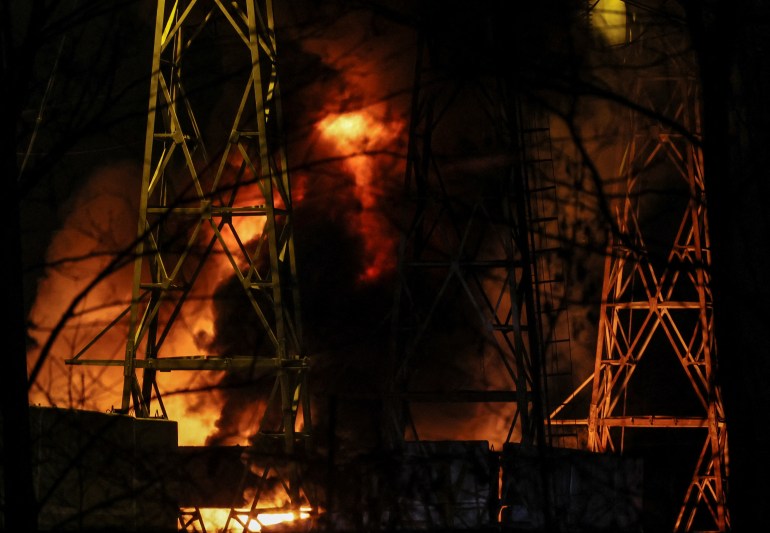Russia drone attack targets ‘critical infrastructure’ in Kyiv
Ukraine’s military says about 20 unmanned aerial vehicles targeted facilities around the capital.

Ukraine’s capital has been targeted by a wave of drone attacks by Russia’s military that again struck “critical infrastructure”.
About 20 drones were deployed to Kyiv and the surrounding area early Monday, according to officials, with air defence systems destroying about 15 of the unmanned aerial vehicles.
Keep reading
list of 4 itemsUkraine cherry picks targets as Russia hammers the east
Ukraine must investigate alleged war crimes by its forces
Photos: Russia launches another large missile attack on Ukraine
Air raid sirens blasted in the early morning before the sky was declared clear at 5:50am (07:50 GMT).
Russia’s drone attack caused “fairly serious” damage in Kyiv and three areas were left without power supply, Governor Oleksiy Kuleba said.
Russia unleashed 35 “kamikaze” drones as many people slept, hitting critical infrastructure in and around Kyiv in Moscow’s third air attack on the Ukrainian capital in six days.
The Kyiv city administration said on its Telegram account that a critical infrastructure point was hit, but did not provide further details.
“The enemy is attacking the capital,” the administration said.
Russian forces were using barrage ammunition from Shaheds, Iran-made drones that have pummeled Kyiv and other cities in recent weeks, it said.

Kyiv Mayor Vitali Klitschko confirmed on Monday that explosions had occurred.
“As a result of the attack on the capital, critical infrastructure facilities were damaged,” Klitschko said on the Telegram messaging app.
“Energy and heating engineers are working to quickly stabilise the situation with energy and heat supply.”
Kuleba also reported private houses were also hit and at least two people were injured. No deaths were reported.
Although the capital seemed the main target of the latest Russian attacks, Ukraine’s military said other places in the country were also hit.
The air force said on Telegram it was able to destroy 30 of at least 35 self-explosives drones Russia launched across the country from the eastern side of the Azov Sea.
The attack follows a Russian bombardment of several cities, including Kyiv, on Friday that triggered widespread power outages and plunged swaths of Ukraine into darkness in the cold winter temperatures.
Russia has increasingly relied on large-scale aerial attacks in its invasion of Ukraine, which began on February 24, after a series of battlefield setbacks.

Ukraine’s government, the United Nations human rights office, and the head of the European Commission have said the attacks constitute war crimes by threatening civilians and stifling basic services in a country where an estimated 18 million people are already in need of humanitarian aid.
The Ukrainian military has reported increasing success in shooting down incoming Russian missiles and explosive drones.
For its part, Moscow has maintained that such attacks are militarily legitimate.
The EU and the US have also ratcheted up sanctions on Iran in an attempt to target people and companies allegedly involved in the country’s drone industry.
In November, Tehran admitted to selling Russia a “limited number of drones” prior to the invasion but has maintained it does not support either side in the conflict.
New offensive?
Ukrainian officials have increasingly warned that Moscow may be planning a renewed offensive in the new year, which could include a new ground assault on Kyiv, although analysts have questioned if Russia has the resources for such an operation.
Monday’s attacks came as Russian President Vladimir Putin prepared to visit ally Belarus, which provided the Kremlin’s forces with a launch pad for its invasion of Ukraine almost 10 months ago.
Putin will hold talks with authoritarian leader Alexander Lukashenko.
Analysts say the Kremlin might look again for some kind of Belarusian military support for its Ukraine operations. But the winter weather and Russia’s depleted resources mean any attack probably won’t come soon, according to the Washington-based Institute for the Study of War.
“The capacity of the Russian military, even reinforced by elements of the Belarusian armed forces, to prepare and conduct effective large-scale mechanized offensive operations in the next few months remains questionable,” the think-tank said in an assessment published Sunday.
It also concluded: “It is unlikely that Lukashenko will commit the Belarusian military [which would also have to be re-equipped] to the invasion of Ukraine.”